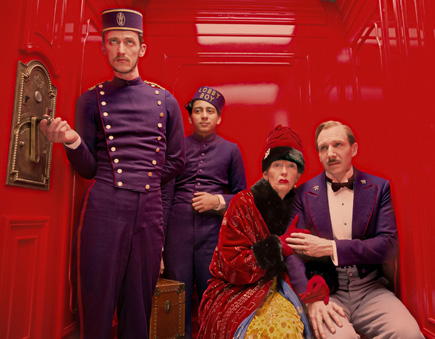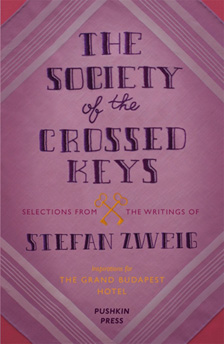Immaculate confections
by Wes Anderson and George Prochnik Wes Anderson discusses how his latest film The Grand Budapest Hotel was sparked by the life and writings of Stefan Zweig. The film is imbued with Anderson’s trademark mix of arch humour, slapstick, stop-motion animation and intricate staging that give a constant and playful nod to the artifices of storytelling and filmmaking. Yet through all the cartoonish capers, the director delivers a moving portrait of unsettling transitions and fading glories across 20th-century Europe between the wars. He speaks to George Prochnik about the inspirations he took for the film from Zweig’s memoir and fictions.
Wes Anderson discusses how his latest film The Grand Budapest Hotel was sparked by the life and writings of Stefan Zweig. The film is imbued with Anderson’s trademark mix of arch humour, slapstick, stop-motion animation and intricate staging that give a constant and playful nod to the artifices of storytelling and filmmaking. Yet through all the cartoonish capers, the director delivers a moving portrait of unsettling transitions and fading glories across 20th-century Europe between the wars. He speaks to George Prochnik about the inspirations he took for the film from Zweig’s memoir and fictions.
Prochnik: There were friends of Zweig who saw him as invested before the war in creating almost a cabinet of curiosities, a museum of Europe – one person described it as a garden – that would serve as a microcosm of the whole vast continent before it all got blown asunder.
Anderson: Vienna – the environment he grew up in was so – I guess, art was the centre of his own activity, and it was also the popular thing. One detail that I remember from The World of Yesterday is that the daily newspapers they got each morning had poetry and philosophical writings. He and his friends went to meet in cafés regularly in groups. And there were new plays continuously being produced, and they were all following these playwrights. Vienna was a place where there was this great deep culture, but it was the equivalent of rock stars – it was the coolest thing of the moment. It was completely popular, and that was Vienna. Zweig was living in the dead centre, ground zero place for this. And he was living there up to the point that it came to an end.
Prochnik: One passage that always strikes me in The World of Yesterday is when he begins to talk about what’s happened to the news, and how it’s suddenly just become – in a way this seems to foreshadow our own world – a kind of non-stop disaster feed. Zweig talks about that moment when suddenly the wireless is working, and you’re getting reports of catastrophes in China, and wars in countries that you don’t know anything about. You’re enveloped in a present-ness that is all about the most sensational, most dispiriting acts of bloodthirstiness and natural catastrophe that really seem to suck away the reflective element that had been part of newspapers when he was young.
Anderson: Ideas and thoughts. Not just accounts of terrible events. I think one thing that Zweig does very simply, that just seems so clear to him, is that he attributes everything that’s gone wrong to nationalism, and the two ideologies of socialism slash communism and fascism. These two movements might be conflicting, but to him they were just equally disastrous –
Prochnik: To the individual.
Anderson: Yes, these dogmas take hold so forcefully or forcibly that it’s just the beginning of the end, and he sees it happen right in front of him. Because of the monolithic nature of them. I think there were all kinds of aspects of socialism he would have embraced. But the problem for him was that people began to identify themselves with these dogmas, and then people began to oppose each other on the basis of these causes or dogmatic kind of movements.
Prochnik: After the First World War Vienna had arguably the most progressive government in Europe – a socialist government, and people came from everywhere to study the model. Zweig was certainly sympathetic to that. It wasn’t something that he advertised about himself, but I’m sure he would have considered his politics from an economic perspective to be in accord with socialism. Back to his fiction, you’ve said that Beware of Pity was really your introduction to Zweig – why did you find this work to be so compelling?
Anderson: The book takes a form that we sort of overtly lifted for our movie, and I particularly loved the opening scene. There’s a wonderful brief introduction from the author, and then it goes back some years, and we see the author who’s visiting a restaurant that he thought would have fallen out of fashion a long time ago, outside Vienna. But then he’s sort of surprised that he’s still seeing people he knows there and this figure – this guy comes over to him, a guy he describes as the sort of person who knows everybody, at least a bit, and bounces around among people and table hops and name drops…
Prochnik: I love the phrase that Zweig has for this type – which translates literally from the German as “Also-present”.
 Anderson: … and the author character has this moment with him. He’s a little unhappy to see him – he wanted to be alone – but at the same time it’s not so bad, and now he has somebody to talk to. And then that “Also-present” figure sees a man across the room our author does not recognise, but then he tells him the man’s name, and the author knows exactly who he’s talking about: he’s a war hero. And then the author and the war hero reconnect by chance at a party the next day, and this time they actually meet. They talk about that guy who was bouncing around the restaurant, and they click. That whole set up to me is the best. First, it’s happening in a setting that is very interesting to me – this Vienna that is unfamiliar and exotic, and at the same time there’s so much that I do feel connected to: that it could be happening in some place like Manhattan today. There are the same kinds of people and dynamics we know from our world. But also details of a universe most of us have no experience of, and that’s great to discover. I remember being gripped by Zweig’s description of the cavalry unit that the lead character is a part of. There’s great detail about that whole way of life. But then we’re pulled into this story very, very quickly. We plunge into an account of what happens to him with a family that he makes a kind of social success with, and who he then gets drawn into a strange, complicated, disastrous relationship with.
Anderson: … and the author character has this moment with him. He’s a little unhappy to see him – he wanted to be alone – but at the same time it’s not so bad, and now he has somebody to talk to. And then that “Also-present” figure sees a man across the room our author does not recognise, but then he tells him the man’s name, and the author knows exactly who he’s talking about: he’s a war hero. And then the author and the war hero reconnect by chance at a party the next day, and this time they actually meet. They talk about that guy who was bouncing around the restaurant, and they click. That whole set up to me is the best. First, it’s happening in a setting that is very interesting to me – this Vienna that is unfamiliar and exotic, and at the same time there’s so much that I do feel connected to: that it could be happening in some place like Manhattan today. There are the same kinds of people and dynamics we know from our world. But also details of a universe most of us have no experience of, and that’s great to discover. I remember being gripped by Zweig’s description of the cavalry unit that the lead character is a part of. There’s great detail about that whole way of life. But then we’re pulled into this story very, very quickly. We plunge into an account of what happens to him with a family that he makes a kind of social success with, and who he then gets drawn into a strange, complicated, disastrous relationship with.
Prochnik: A relationship centred around a sort of warped pity – this whole fascinating double definition of pity that Zweig gives at the outset, that’s really at the core of what the book is trying to explore. There’s pity that’s meant just to exonerate the person expressing it from actually having to deal with the object of their pity – and then there’s another kind of pity, that consumes the whole being of the compassionate person as he or she tries to merge in solidarity with the object of pity right to the end, and beyond.
Anderson: Yes, and at each step the novel’s protagonist tries to do the right thing, and at the same time his motivations are a little bit complicated; but everything he does, even while it may rescue the situation for a moment, actually ends by digging him in deeper and deeper and deeper. And the other thing that happens is that this book leads up to the war. It was shortly after finishing Beware of Pity that I started reading The World of Yesterday. You see how this moment is reflected over and over again in his work.
This is an edited extract from ‘A Conversation with Wes Anderson’ in The Society of Crossed Keys: Selections from the Writings of Stefan Zweig, published by Pushkin Press.
Read an extract from The World of Yesterday.
Wes Anderson is a director and screenwriter whose earlier films include Bottle Rocket, Rushmore, The Royal Tenenbaums, The Life Aquatic with Steve Zissou, The Darjeeling Limited, Fantastic Mr Fox and Moonrise Kingdom.
imdb.com
George Prochnik is the author of The Impossible Exile: Stefan Zweig at the End of the World (Other Press, May 2014) and editor-at-large for Cabinet magazine.
otherpress.com
Watch the film trailer:


